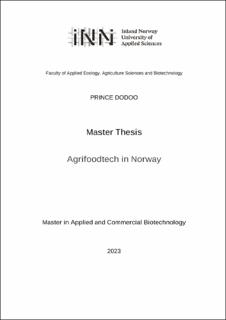| dc.description.abstract | The agrifoodtech industry consists of the agritech sector and the foodtech sector, which uses technology for agriculture and the food industry. The agrifoodtech industry helps farms and businesses to be more efficient, profitable, safer, sustainable, and environmentally friendly. The global industry is close to US$ 9 trillion and dominated by United States (US$21 billion), China (US$7.3 billion), Indian(US$4 billion) and other European countries such as Germany (US$3 billion), France (US$1 billion) in 2021 (AgFunder, 2022a). Norway had US$0.3 billion investment market share in 2021(AgFunder, 2022b). The Norwegian agrifoodtech industry is small but growing rapidly and has the potential to succeed globally. The study aimed at determining how the Norwegian agrifoodtech can succeed internationally with a focus on the agritech sector.
Qualitative research was conducted by interviewing 3 Norwegian farmers and 4 experts with knowledge of Norwegian agrifoodtech companies, industry and farming. A purposive sampling including snowball sampling was used to obtain the participants. Secondary data were collected from published research articles, industrial reports, company and government reports.
An overview of agrifoodtech in Norway shows that there are at least 108 Norwegian companies distributed over the country but most frequent in Innlandet, Trøndelag, Oslo and Akershus Rogaland counties. The Norwegian companies seem to be strong in the biotech-genetic sector, which is important to consider in the exportation of solutions to foreign markets. There are cluster of smart farm and digital solutions companies and circular solutions companies in indoor/vertical farming as well as bioresource solution companies in the country which can also be considered for the international market.
Farmers with large and profitable farms seem to dominate in the use of biotech-genetic solutions and full-time farmers with small farms seem to dominate in the acquisition of smart farm and digital solutions. Moreover, there is a potential market for the use of automated Norwegian solutions by part-time farmers with small farms.
The technology readiness among farmers in Norway seems to be high in some regions such as Innlandet and Akershus counties. Additionally, the use of the agritech solutions by farmers can be found in some countries including Norway, German, and France and the UK. It is likely that that profitability, sustainability, finance, education and experience are the main factors that affect the readiness of farmers and businesses to use the technologies in Norway. Additionally, farmers with large and profitable farms and full-time farmers with small farms seem to tend to pay and use sustainable technologies. There is a possibility the that marketing of sustainable technology in Norway and abroad can be enhanced with the use of sustainable labels. | |
